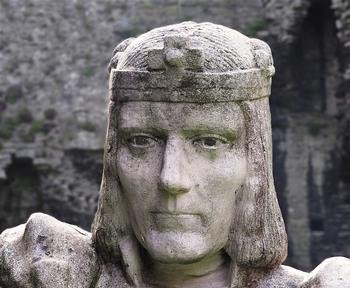Quiz Answer Key and Fun Facts
1. Becoming king as a minor upon the death of his father King John, who acted as Regent for the first four years of Henry III's reign?
2. Who was Henry's mother?
3. Henry had the best claim to the throne at the time of John's death.
4. Henry was crowned twice. The first coronation was a makeshift affair as the regalia had been lost by King John in the Wash. Where did this coronation take place?
5. At the time of John's coronation, the Angevin empire comprised of virtually all western France from the Spanish border to the English channel. By the time Henry was crowned, the Angevin empire consisted of which areas?
6. When William Marshal died, Henry was only 12 years old and did not assume control of the government. At this time Hubert de Burgh became regent, a position he retained until Henry assumed direct rule in 1227, at which time he became chief justiciar. De Burgh had an enemy in council who arranged his downfall in 1232 and assumed control of the government. Who was this man?
7. One of the reasons that des Roches and his government were opposed by the barons of England was that he was a 'foreigner'. From where did he come?
8. In 1234 Henry assumed direct control of the government, partially as a result of a delegation of barons whose aim was to expel the Poitevins. Shortly thereafter he married. Who was his bride?
9. How many children did Henry have?
10. Henry III, king at nine years and eighteen days, was the second youngest monarch to ascend the throne since the Conquest. Who was the youngest monarch to ascend the throne?
11. Henry III reigned longer than any other medieval king of England.
12. Henry was born in the old capital of England and the city which continued to hold the treasury. Which was it?
13. Henry had a younger brother who became famous in his own right as he was elected 'King of the Romans'. Although sometimes at odds with his brother, generally this younger sibling was supportive. Who was he?
14. One of the officials in medieval times was the seneschal. What was a seneschal?
15. Simon de Montfort was appointed seneschal of which of Henry's domains?
16. Although Henry was not at his best in the field as a soldier, he performed better as a diplomat and negotiator.
17. Simon de Montfort had a familial relationship with Henry III. What was it?
18. One of the subjects of disagreement between Henry and his barons was that of the financial situation of the country. The national debt was significant at the accession of Henry due to the wars of both his uncle Richard and his father John. Henry, however, added to the problem. One of the causes for the increasing debt was his support of his son's attempt to become King of Sicily. Which son was this?
19. While the financial situation was one cause of baronial resentment, another significant cause was the favoritism Henry showed to his family.
20. As a result of the financial crisis, the barons forced Henry to agree to a series of changes to governmental administration. What was this agreement was called?
21. Henry III attempted to thwart the agreement he had made with the barons and the matter was referred to another important personage for mediation. To whom were these provisions referred?
22. Matters came to a head when Simon de Montfort led troops against Henry III and Edward his eldest son. Henry, his brother Richard and his son Edward were captured in a decisive battle. Which battle was this?
23. One year after their defeat, the royalist forces led by Edward, the king's elder son, were successful in defeating the forces of the barons. Which battle was this?
24. Henry's strong willed wife survived him by almost 20 years. Although not well liked, she remained in England and retired to an abbey. In which abbey did she become a nun and find her final resting place?
25. Where was Henry III buried?
Source: Author
tripeuro
This quiz was reviewed by FunTrivia editor
fringe before going online.
Any errors found in FunTrivia content are routinely corrected through our feedback system.


